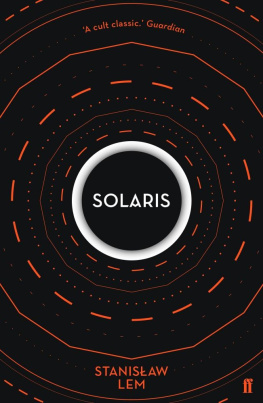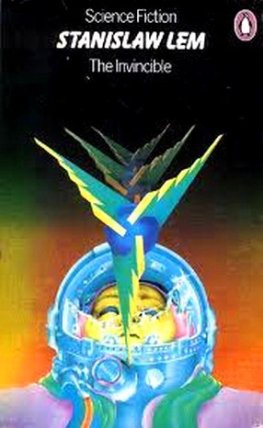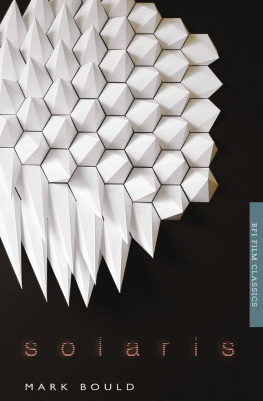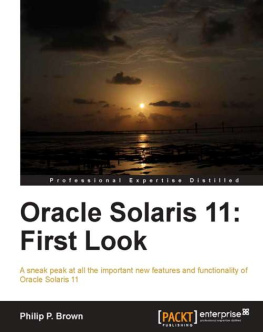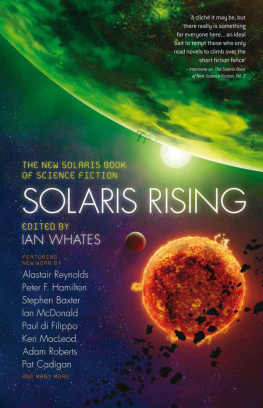B OOKS BY S TANISLAW L EM
Solaris
The Invincible
Memoirs Found in a Bathtub
The Cyberiad: Fables for the Cybernetic Age
The Futurological Congress
The Investigation
The Star Diaries
Mortal Engines
The Chain of Chance
A Perfect Vacuum
Tales of Pirx the Pilot
Return from the Stars
The Cosmic Carnival of Stanislaw Lem
More Tales of Pirx the Pilot
Memoirs of a Space Traveler:
Further Reminiscences of Ijon Tichy
His Master's Voice
Microworlds: Writings on Science Fiction and Fantasy
Imaginary Magnitude
One Human Minute
Fiasco
Hospital of the Transfiguration
Eden
Peace on Earth
SOLARIS
Stanislaw Lem
translated from the French by
Joanna Kilmartin and Steve Cox
A HARVEST BOOK
HARCOURT BRACE & COMPANY
San Diego New York London
Copyright 1961 by Stanislaw Lem
Translation copyright 1970 by Faber and Faber Ltd. and Walker and Company
AIl rights reserved. No part of this publication may be reproduced or transmitted in any form or by any means, electronic or mechanical, including photocopy, recording, or any information storage and retrieval system, without permission in writing from the publisher.
Requests for permission to make copies of any part of the work should be mailed to: Permissions Department, Harcourt Brace & Company, 6277 Sea Harbor Drive, Orlando, Florida 328876777.
Library of Congress Catalogingin-Publication Data
Lem, Stanislaw
Solaris.
Reprint. Originally published: New York: Walker, 1970.
"A Harvest book."
I. TItle
PG7158.L39.S613 1987 891.8'537 86-31938
ISBN 0-15-683750-1
Printed in the United States of America
First Harvest edition 1987
V U T S R Q P O N M
Contents
At 19.00 hours, ship's time, I made my way to the launching bay. The men around the shaft stood aside to let me pass, and I climbed down into the capsule.
Inside the narrow cockpit, there was scarcely room to move. I attached the hose to the valve on my space suit and it inflated rapidly. From then on, I was incapable of making the smallest movement. There I stood, or rather hung suspended, enveloped in my pneumatic suit and yoke to the metal hull.
I looked up; through the transparent canopy I could see a smooth, polished wall and, far above, Moddard's head leaning over the top of the shaft. He vanished, and suddenly I was plunged in darkness: the heavy protective cone had been lowered into place. Eight times I heard the hum of the electric motors which turned the screws, followed by the hiss of the shock-absorbers. As my eyes grew accustomed to the dark, I could see the luminous circle of the solitary dial.
A voice echoed in my headphones:
"Ready Kelvin?"
"Ready, Moddard," I answered.
"Don't worry about a thing. The Station will pick you up in flight. Have a good trip!"
There was a grinding noise and the capsule swayed. My muscles tensed in spite of myself, but there was no further noise or movement.
"When is lift-off?" As I asked, I noticed a rustling outside, like a shower of fine sand.
"You're on your way, Kelvin. Good luck!" Moddard's voice sounded as close as before.
A wide slit opened at eye-level, and I could see the stars. The Prometheus was orbiting in the region of Alpha in Aquarius and I tried in vain to orient myself; a glittering dust filled my porthole. I could not recognize a single constellation; in this region of the galaxy the sky was unfamiliar to me. I waited for the moment when I would pass near the first distinct star, but I was unable to isolate any one of them. Their brightness was fading; they receded, merging into a vague, purplish glimmer, the sole indication of the distance I had already travelled. My body rigid, sealed in its pneumatic envelope, I was knifing through space with the impression of standing still in the void, my only distraction the steadily mounting heat.
Suddenly, there was a shrill, grating sound, like a steel blade being drawn across a sheet of wet glass. This was it, the descent. If I had not seen the figures racing across the dial, I would not have noticed the change in direction. The stars having vanished long since, my gaze was swallowed up on the pale reddish glow of infinity. I could hear my heart thudding heavily. I could feel the coolness from the air-conditioning on my neck, although my face seemed to be on fire. I regretted not having caught a glimpse of the Prometheus , but the ship must have been out of sight by the time the automatic controls had raised the shutter of my porthole.
The capsule was shaken by a sudden jolt, then another. The whole vehicle began to vibrate. Filtered through the insulating layers of the outer skins, penetrating my pneumatic cocoon, the vibration reached me, and ran through my entire body. The image of the dial shivered and multiplied, and its phosphorescence spread out in all directions. I felt no fear. I had not undertaken this long voyage only to overshoot my target!
I called into the microphone:
"Station Solaris! Station Solaris! Station Solaris! I think I am leaving the flight-path, correct my course! Station Solaris, this is the Prometheus capsule. Over."
I had missed the precious moment when the planet first came into view. Now it was spread out before my eyes; flat, and already immense. Nevertheless, from the appearance of its surface, I judged that I was still at a great height above it, since I had passed that imperceptible frontier after which we measure the distance that separates us from a celestial body in terms of altitude. I was falling. Now I had the sensation of falling, even with my eyes closed. (I quickly reopened them: I did not want to miss anything there was to be seen.)
I waited a moment in silence before trying once more to make contact. No response. Successive bursts of static came through the headphones, against a background of deep, low-pitched murmuring, which seemed to me the very voice of the planet itself. A veil of mist covered the orange-colored sky, obscuring the porthole. Instinctively, I hunched myself up as much as my inflated suit would allow, but almost at once I realized that I was passing through cloud. Then, as though sucked upwards, the cloud-mass lifted; I was gliding, half in light, half in shadow, the capsule revolving upon its own vertical axis. At last, through the porthole, the gigantic ball of the sun appeared, looming up on the left and disappearing to the right.
A distant voice reached me through the murmuring and crackling.
"Station Solaris calling! Station Solaris calling! The capsule will land at zero-hour. I repeat, the capsule will land at zero-hour. Stand by for count-down. Two hundred and fifty, two hundred and forty-nine, two hundred and forty-eight"
The words were punctuated by sharp screeching sounds; automatic equipment was intoning the phrases of the reception-drill. This was surprising, to say the least. As a rule, men on space stations were eager to greet a newcomer, especially if he was arriving direct from Earth. I did not have long to ponder this, for the sun's orbit, which had so far encircled me, shifted unexpectedly, and the incandescent disc appeared now to the right, now to the left, seeming to dance on the planet's horizon. I was swinging like a giant pendulum while the planet, its surface wrinkled with purplish-blue and black furrows, rose up in front of me like a wall. As my head began to spin, I caught sight of a tiny pattern of green and white dots; it was the station's positioning-marker. Something detached itself with a snap from the cone of the capsule; with a fierce jerk, the long parachute collar released its hoops, and the noise which followed reminded me irresistibly of Earth: for the first time after so many months, the moaning of the wind.
Everything went quickly after this. So far, I had known that I must be falling; now I could see it for myself. The green and white checker-board grew rapidly larger and I could see that it was painted on an elongated silvery body, shaped like a whale, its flanks bristling with radar antennae. This metal colossus, which was pierced with several rows of shadowy apertures, was not resting on the planet itself but suspended above it, casting upon the inky surface beneath an ellipsoidal shadow of even deeper blackness. I could make out the slate-colored ripples of the ocean, stirring with a faint motion. Suddenly, the clouds rose to a great height, rimmed with a blinding crimson glare; the lurid sky became grey, distant and flat; everything was blotted out; I was falling in a spin.
Next page
